人教版(2019)选择性必修 第一册Unit 1 People of Achievement课件(共118张PPT)
文档属性
| 名称 | 人教版(2019)选择性必修 第一册Unit 1 People of Achievement课件(共118张PPT) |
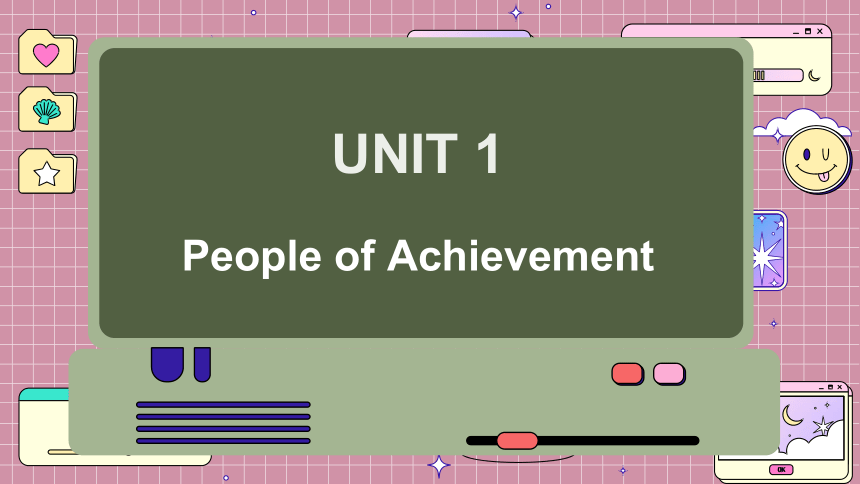
|
|
| 格式 | pptx | ||
| 文件大小 | 3.0MB | ||
| 资源类型 | 教案 | ||
| 版本资源 | 人教版(2019) | ||
| 科目 | 英语 | ||
| 更新时间 | 2024-04-26 00:00:00 | ||
图片预览

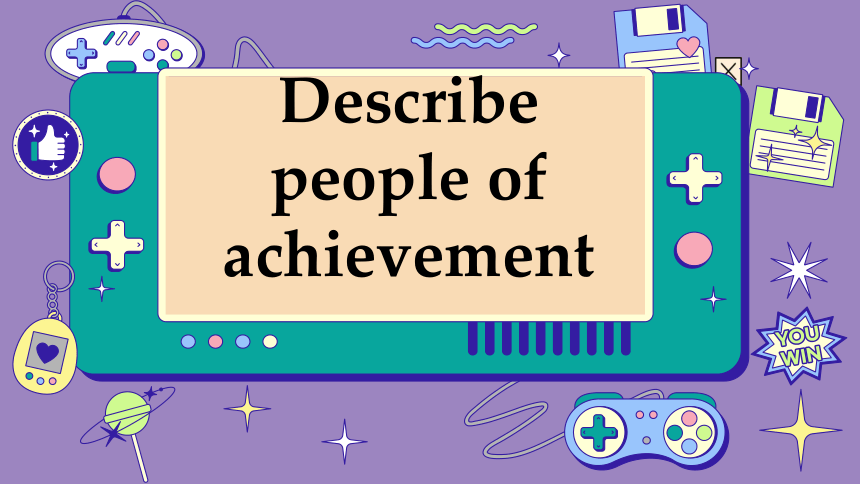
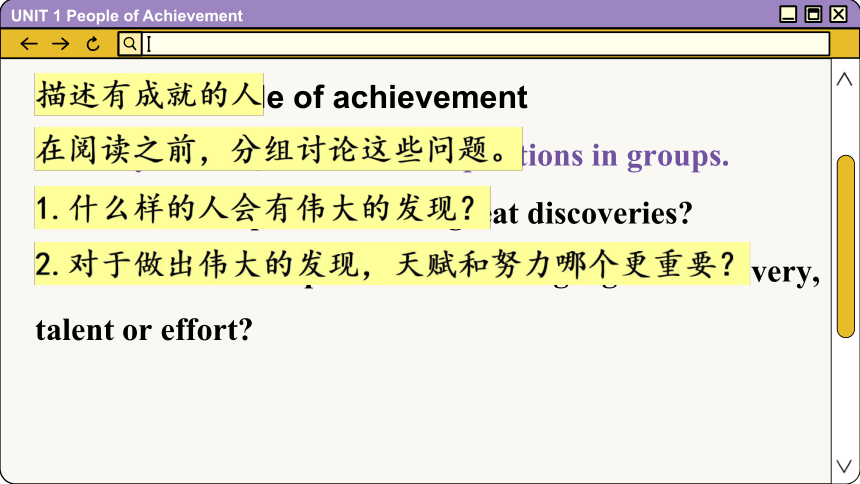
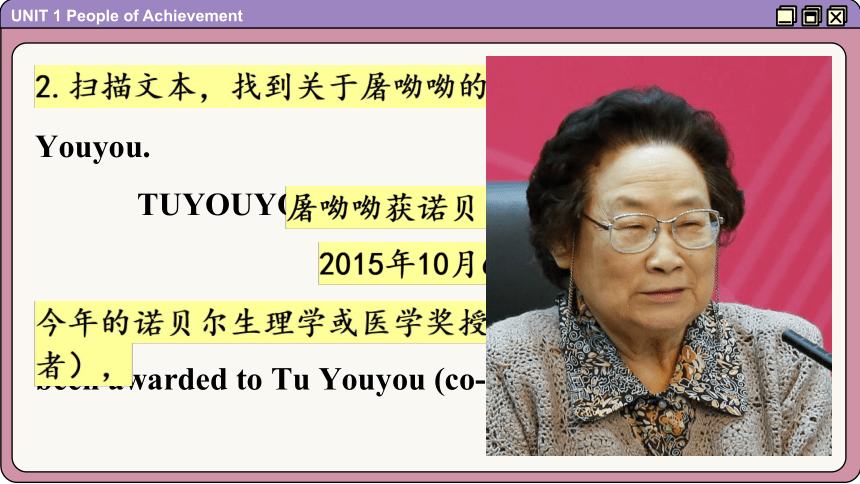
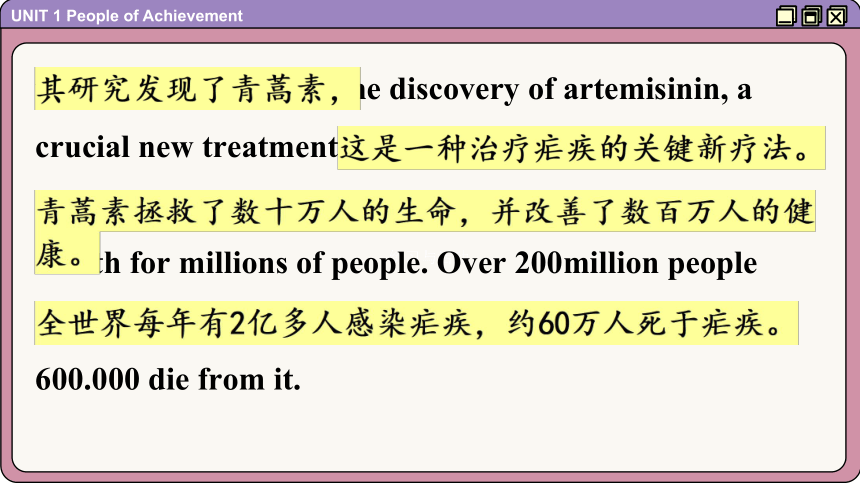
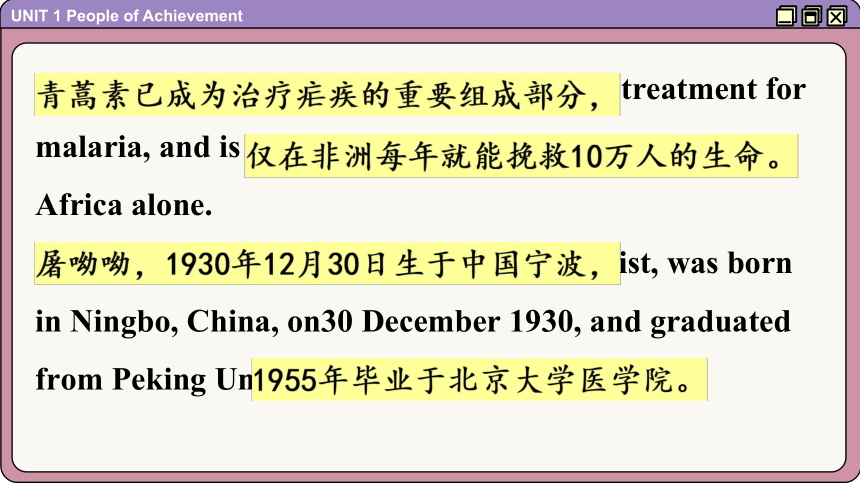
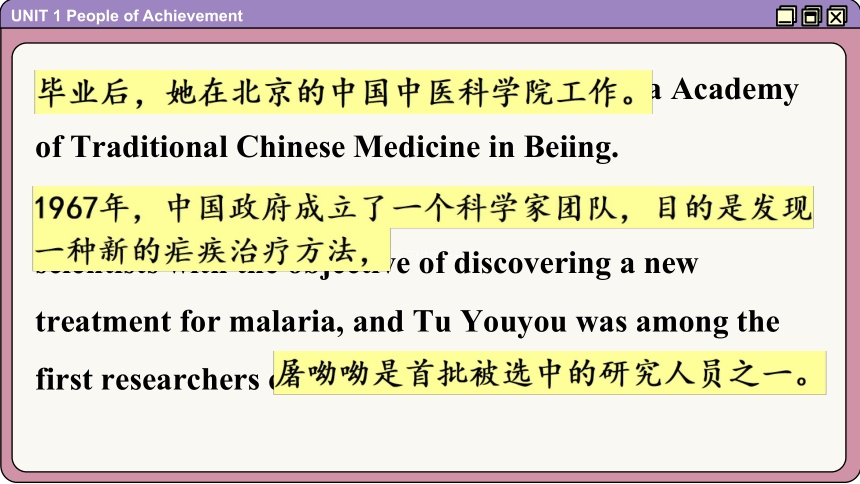

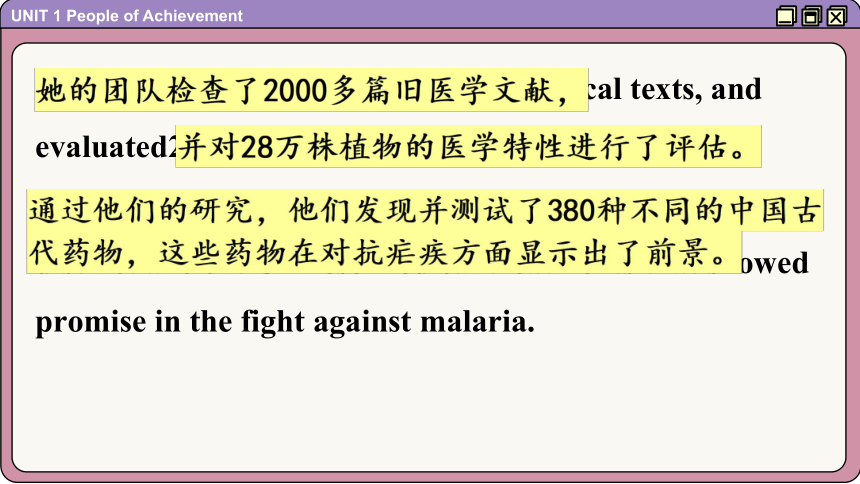
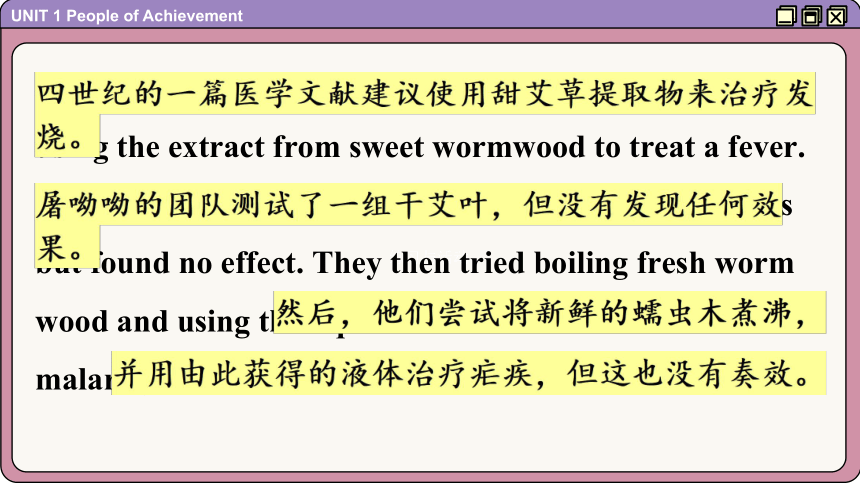
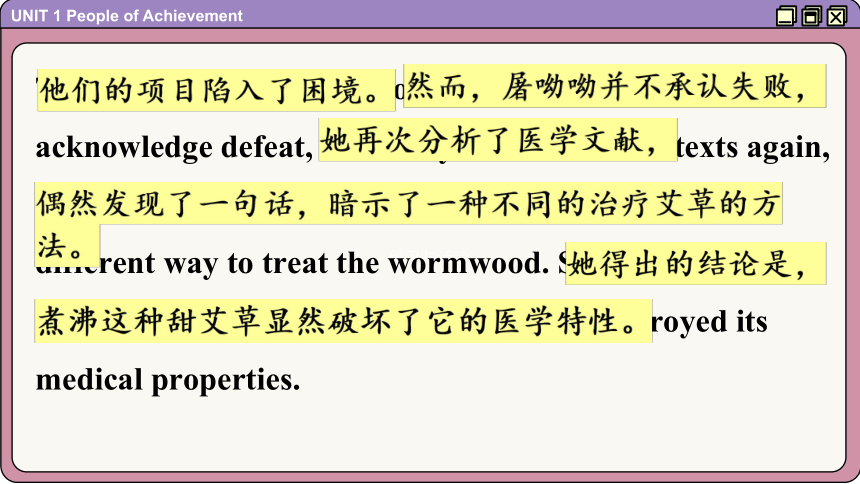
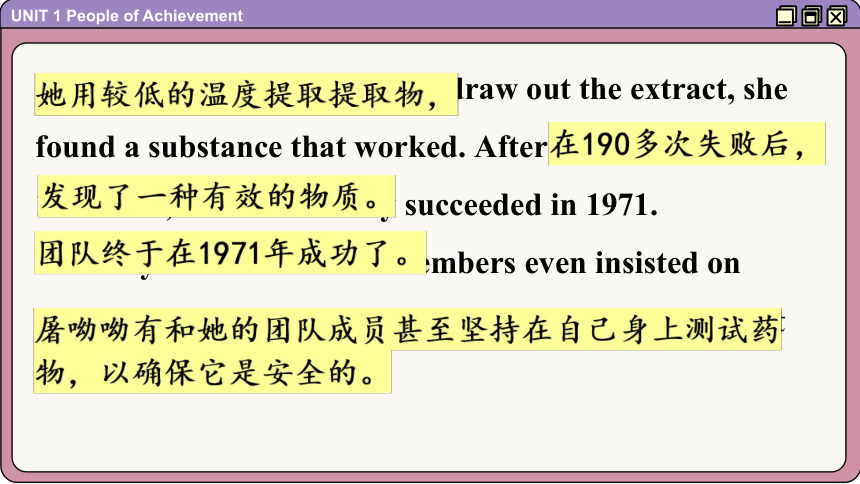
文档简介
(共118张PPT)
UNIT 1
People of Achievement
Describe people of achievement
Describe people of achievement
Before you read, discuss these questions in groups.
1.What kind of person makes great discoveries
2.Which is more important for making a great discovery, talent or effort
2.Scan the text and find descriptive words about Tu Youyou.
TUYOUYOUAWARDED NOBEL PRIZE
6 October 2015
This year's Nobel Prize for Physiology or Medicine has been awarded to Tu Youyou (co-winner),
whose research led to the discovery of artemisinin, a crucial new treatment for malaria. Artemisinin has saved hundreds of thousands of lives, and has led to improved health for millions of people. Over 200million people around the world get malaria each year, and about 600.000 die from it.
Artemisinin has become a vital part of the treatment for malaria, and is thought to save 100,000 lives a year in Africa alone.
Tu Youyou, a commited and patient scientist, was born in Ningbo, China, on30 December 1930, and graduated from Peking University Medical School in1955.
After she graduated, she worked at the China Academy of Traditional Chinese Medicine in Beiing.
In 1967, the Chinese government formed a team of scientists with the objective of discovering a new treatment for malaria, and Tu Youyou was among the first researchers chosen.
In the beginning, Tu Youyou went to Hainan, where malaria was more common, to study malaria patients.
In 1969, she became the head of the project in Beijing and decided to review ancient Chinese medical texts to find traditional botanical treatments for the disease.
Her team examined over 2,000 old medical texts, and evaluated280,000 plants for their medical properties. From their research, they discovered and tested 380 distinct ancient Chinese medical treatments that showed promise in the fight against malaria.
One medical text from the fourth century suggested using the extract from sweet wormwood to treat a fever. Tu's team tested a collection of dried wormwood leaves but found no effect. They then tried boiling fresh worm wood and using the liquid obtained from this to treat malaria, but this did not work either.
Their project got stuck. However, Tu Youyou would not acknowledge defeat, She analysed the medical texts again, and by chance, she found one sentence suggesting a different way to treat the wormwood. She concluded that boiling the sweet wormwood apparently destroyed its medical properties.
Using a lower temperature to draw out the extract, she found a substance that worked. After failing more than 190 times, the team finally succeeded in 1971.
Tu Youyou and her team members even insisted on testing the medicine on themselves to make sure that it was safe.
Later, the medicine was tested on malaria patients, most of whom recovered. This medicine, which was called artemisinin, soon became a standard treatment for malaria. According to Tu Youyou, the discovery of artemisinin was a team effort.
Upon hearing that she had been awarded the Nobel Prize, she said, "The honour is not just mine, There is a team behind me, and all the people of my country.This success proves the great value of traditional Chinese medicine. t is indeed an honour for China's scientific research and Chinese medicine to be spread around the world."
Circle the answers to the questions below.
1 Where would you most likely find this passage
A In a blog. B In a book.
C In a letter. D In a newspaper.
2 Passages like this are most often written in _______and _______
A the active voice/offer many opinions
B the first person/talk about feelings
C both active and passive voices/mostly contain facts
3.Which two pieces of information were not included in the passage
A.quote from Tu Youyou.
B.The details of how artemisinin was discovered.
C.Tu Youyou's important contributions other than the discovery of artemisinin.
D.Tu Youyou's personal life.
E.Tu Youyou's road to discovering artemisinin.
F.What Tu Youyou was awarded.
G.Why artemisinin is an important discovery.
4.Read the text again and answer the questions.
1.Why is the discovery of artemisinin important
Artemisinin has saved hundreds of thousands of lives and has improved the health for millions of people.
2.What was the key to getting a good extract from the wormwood
Using a lower temperature to draw out the extract.
3.What numbers are mentioned in the text What do they suggest
200 million; 600,000; 100,000; 2,000; 280,000; 380; 190These numbers suggest three things: how big a health problem malaria is, how much time Tu Youyou spent in looking for apossible new treatment for malaria,
and how patient and persistent Tu Youyou and her team were to tackle the disease.
4.Why is Tu Youyou considered a great person
She is considered a great person because through her effortsmany lives have been saved.
5.Complete the flow chart, Then tell the story of how artemisinin was discovered.
Build up your vocabulary
Write down the word that matches each definition, Then find the sentences containing these words in the text.
①____________cook something in very hot water
②____________ relating to plants
③____________ qualities or characteristics of something
boil
botanical
property
④____________ a kind of substance that flows freely, such as water or milk
⑤____________ physical material that exists
liquid
substance
2 Guess the meaning of the underlined words. Then fill in the blanks with words that have the same roots.
①The two flowers are quite distinct from one another, so it is easy to make a ______________ between them.
②Scientists need to________ how the new material stands up to wear and tear to prove how valuable it is.
③A talented scientist well known for his ____________to his country,Huang Danian committed himself to his research in geophysics.
4.A: Did you come to any conclusions
B: Yes,we _____________that by drawing out the extract at a low temperature, we could find the substance that we needed to complete the experiment.
5.She spends a lot of time_________ her patients’ dreams. This analysis is very helpful, explaining their daily behaviour very well.
3.Read the passage about Lu Xun. Fill in the blanks with the correct forms of the words in the box.
insist obtain objective acknowledge apparently crucial
Lu Xun, __________________as one of the greatest modern writers in China, was born in Shaoxing.
Zhejiang Province in 1881 In 1904, he went to Japan and became a medical student, with the __________ of improving people's health and saving lives. However, he changed his mind when he saw in a photo a Chinese man about to be killed by a Japanese soldier.
It struck him that the other Chinese men in the photo ____________did not care about what was happening to their fellow countrymen. From this, he concluded that the___________ problem in China was not physical iliness, but the spiritual illness of people at that time.
Following this, he quit medical school. When he returned to China in 1908, he_________a teaching job.In 1917, a friend_________that he help write for a magazine called New Youth That was how his first famous short story A Madman's Diary got published.
④ In pairs, discuss how people can achieve success, using words and expressions you have learnt in this unit.
Discover useful structures
①Read the following sentences and underline the relative clauses. Then name the two types of clauses and state their functions.
They tested hundreds of Chinese medical treatments that showed promise in the fight against the disease.
Tu Youyou was awarded the Nobel Prize, which is considered one of the highest international honours a person can receive.
Tu Youyou went to Hainan, where malaria was more common, to study malaria patients.
Later, the medicine was tested on malaria patients, most of whom recovered.
2.Rewrite the sentences using non-restrictive relative clauses. How do the sentences flow differently
EXAMPLE
The book tells us about Alexander Fleming.
He discovered penicillin.
The book tells us about Alexander Fleming, who discovered penicillin.
①We were very impressed by the old man. He was not wiling to acknowledge defeat.
②Afterwards, Einstein had to flee Germany. Hitler was in power there.
③There is nothing we can do to help Linda. Her circumstances are beyond our control.
④The teacher asked us to listen to a speech by his favourite novelist, J.K. Rowling. lt inspired us a lot.
⑤The building under construction was designed by 1.M. Pei-a famous Chinese-American architect. He was born in Guangzhou, China.
⑥I was asked to explain the project with the help of a flow chart. It was a big challenge for me.
3.Work in plete the sentences using non-restrictive relative clauses to give extra information, Then share them with your group members.
EXAMPLE
I'd like to try .... ...
I'd like to try that Chinese herbal medicine again, which seems to work best for my cough
1 I would like to travel around ..., ...
2 What impressed me most ..., ...
3 My favourite scientist is .... ...
4 Finally we arrived at .... ...
5 My grandparents like .... ...
6 I wish to obtain ..., ...
7 My best friend ..., ...
Explore the meaning of greatness
1.Match the people with their achievements. Then share with a partner what you know about the people and their achievements.
1 Alexander Fleming A contributed to a new treatment for malaria
2 Florence Nightingale B discovered penicillin
3 Wu Mengchao C founded modern nursing
4 Zhong Nanshan D performed operations well into his 90s
5 Tu Youyou E managed the SARS outbreak
2.Listen to the conversation. Who does each speaker admire Tick the correct boxes in the table below.
Name Dr Wang Wang Le Anna Smith
Alexander Fleming
Zhong Nanshan .
Ftorenee Nightingale
Wu Mengchao
Tu Youyou
Dr Wang
3.Listen again and answer the questions below. You can discuss them with a partner.
1 Why did Anna meet Wang Le at her home
2 Why did Dr Wang decide to become a doctor
3 What kind of person does Wang Le admire Why
4 What advice did Dr Wang give Do you agree with him Give your reasons.
4 Work in groups. Brainstorm the names of some great people and write them in the table below.
Discuss what makes these people great. Try to use the following language fillers to give yourself time to think.
6 Use your discussion to draw conclusions about the meaning of greatness.
The following expressions may help you. Then report back to the class.
Introduce someone you admire
1 What do you know about Albert Einstein Read the text and complete the timeline. Then introduce Einstein's life story and achievements in your own words.
THE MAN WHO CHANGED OUR UNDERSTANDING OF THE UNIVERSE
Albert Einstein, who is perhaps the greatest scientist in modern physics, is often considered one of the smartest men who ever lived.
He made numerous contributions to the world, the most well-known being the general theory of relativity and the famous formula
Einstein was not only a genius;
he was a courageous and kind figure loved by many people.
This gentle genius was born in Germany on 14 March 1879.When he was 16, he tried to enter university in Switzerland, but failed due to his low scores in the general part of the entrance exam, despite obtaining exceptional scores in maths and physics.
After studying for another year, he managed to pass the exam, entering university in 1896 and graduating in 1900.
After two years of looking for work as a teacher, Einstein took a job as a clerk in the Swiss patent office. While working there, out of a strong passion for knowledge, he continued to study, earning a doctorate in physics in 1905.
That same year, which was later recorded as a miracle year in science, he published four extraordinary physics papers. Following this, he gradually became famous throughout the world as the new lsaac Newton.
After four years, he was able to quit his job at the patent office and enter research full-time at a university. In 1922, he was awarded the 1921 Nobel Prize for Physics for his explanation of the photoelectric effect.
Circumstances changed in 1933, when Hitler came to power in Germany. Einstein, who was Jewish, found the doors of academic institutions closed to him. As a consequence. he had to flee Germany.
After spending time in Europe, he finally took up a position as a researcher at the Institute for Advanced Study in Princeton, USA. Following that, he continued to make great achievements in physics and mathematics.
To the public, he was seen as a slightly odd-looking but kind and funny man. He had a thick moustache and long white hair, which sometimes stood on end as though he had just received an electric shock. Although he was a genius, he sometimes forgot things, like his friends' birthdays.
But despite his peculiarities, he was loved by his friends and neighbours.
There is even a story about how he helped a little girl who knocked on his door and asked for help with her homework.
In fact, Einstein often encountered people on the street who would stop him and ask him to help explain things.
After many such occasions,
he finally started saying,“Pardon me! Sorry! Always I am mistaken for Professor Einstein!”
On 18 April 1955, it was reported that Einstein had passed away, and the whole world mourned the great loss of a brilliant scientist.
2 In pairs, discuss the following questions.
1.Apart from his remarkable achievements, what does the passage tell us about Einstein's life
Though he was brilliant, he was also a personwho faced struggles , for example, when he failedto pass his university entrance exam,when hefailed to get a good job , and when he had to fleeGermany.
2. What impressed you most about Einstein State your reasons.
I am impressed most by how friendly and easy hewas to approach. Even when he was busy and didnot want to be bothered, he still found a way todeal with people in gentleness and good humour.
3 Study the organisation and language features.
1 What type of writing is this text How does the writer develop the text
The text is a biography, which is developed chronologically.
2 Find the descriptions that tell us what Einstein looked like and what kind of person he was.
He had a thick moustache...received an electric shock. Althoughhe was a genius,...his friends' birthdays. But despite...loved byhis friends and neighbours. There is even a story ... with herhomework.
In fact,...help explain things. After many such ...“ Pardon me! sorry! Always I am mistaken for ProfessorEinstein!”
3 What rhetorical devices are used in the passage Give examples.
analogy: as the new Isaac Newton; personification: ( hair )stood on end; simile: as though he had just received an electricshock; metaphor: the doors of academic institutions;euphemism:passed away
4 Write an introduction about someone you admire.
① Choose the person you are going to write about. It should be someone you think is great in some way. lt can be an ordinary person, such as a parent, a relative, or a friend.
② Make a list of things that need to be included in your introduction.
③ Use your notes to write your introduction and sum up how you feel about this person.
5 Exchange your draft with a partner.
① Use the checklist to help you review your partner's draft.
√ Does the writer describe the person's appearance and personality
√ Does the writer tell an impressive story of the person's life
√ Does the writer say why the person is great
√ Does the writer sum up how he/she feels about this person
② Take your draft back and revise it.
6 Share your introduction with the rest of the class.
Assessing Your Progress
1 Complete the sentences with the correct forms of the words in the box
gentle sum up circumstance encounter novelist patent
1.To our surprise, he was actually the__________and caring father of three children.
2.To__________, his fame and wealth were gained through hard work and his in depth knowledge of his business.
3.A genius for invention, Thomas Edison obtained scores of__________
4.Under no________________should we do terrible things to other people.
5.As a botanist, he takes notes on the properties of any plant he______________.
6.The first-person narrator is a stylistic device that has been used by many____________ and poets throughout the ages.
2 What do you know about Sun Yat-sen Read the passage, and then fill in the blanks with relative pronouns or adverbs.
Sun Yat-sen (1866-1925) was widely considered to be the founder and forerunner of modern China. He was only in power for a short time, when he was president of the country in 1912. So it may seem odd to some people _________knowledge of China may be limited that he is such an important figure.
However, his influence is not based on his time in office, but on his continuous struggle for a better society and his concern for all Chinese people. He also put forward many advanced ideas ____________brought the Chinese people together, in particular, the Three Principles of the People.
These principles were inspired by Lincoln, ____________he admired, and were developed when he was travelling overseas, __________ he went to find support for his country. The first principle is about nationalism, _________indicates that China should never be divided and should not be under any foreign control.
The second is about people's rights. It means that all people have great value and should also have the same rights. The third is about people's livelihood,______means that the government should create opportunities for people to make a good living.
REFLECTING
Did this unit cause you to change your thoughts about greatness if so, how
Will what you have learnt in this unit inspire you to improve yourself if so, how
What was the most important idea that you learnt in this unit
Overall, I thought this unit was
○ inspiring ○ useful
○ so-so ○ difficult.
*Project: Prepare a book report
Discuss these questions in groups.
Have you ever read a biography or an autobiography of a great person
Would your ecommend this book Why or why not
2 Which great person would you like to read more about 3 Where can you find recommendations for good biographies or autobiographies
该书告诉了小说家曹雪芹的生平故事。曹出生在一个富裕的家庭,但他的大部分生活都非常贫困。他根据自己的生活经历写了这部著名的小说,并在他死后出版。
尽管凯勒在22岁时就写了这本自传,但它被认为是美国文学中的一本伟大的书。它告诉了她黑暗而沉默的童年,以及她的老师安妮·沙利文如何通过教她如何沟通,为她打开了一个新的世界。
艾萨克森采访了乔布斯四十多次,采访了数百位乔布斯的朋友、亲戚和竞争对手,总结了乔布斯非凡的一生。结果是一个有趣的故事,一个男人被驱使去成功,并被驱使去制造完美的产品。
Choose a biography or autobiography of a great person. Read the book, and then write a book report. Keep these points in mind:
Use the examples above to help you.
Write about how the book makes you feel or think about that person.
Write about your overall feelings about the book and its quality.
Give your opinion: Should others read this book as well Why or why not
3 Present your book report to your group. Answer any questions about the book.
梅兰芳至今仍是京剧大师之一。他在将京剧推向世界,使其获得今天的国际地位和认可方面发挥了关键作用。梅兰芳仍然以其高超的技艺、善良的心地和对祖国的挚爱而被人们广泛铭记。
WHILE YOU WATCH
Check your answers in Before You Watch.
2Complete the sentences.
①The great Indian author Rabindranath Tagore________________________________about Mei Lanfang.
2 In the USA, many fans _____________________after the performances to shake his hand.
3 Mei Lanfang brought Beijing Opera abroad so that more people could of _________________________________________Chinese culture and art.
4 When Japanese troops invaded China, Mei Lanfang______________________________________________________
AFTER YOU WATCH
Discuss these questions in groups.
1 How did Mei Lanfang become a legend in the art of Beijing Opera
Because of his great acting skill and because he took traditions from the past and adapted the best parts to create new and enrich oldforms of Beijing Opera.
2Why is Mei Lanfang greatly loved by so many people
Because of his great kindness to all people and his deep love for his country.
3 Who else can you think of that has commited himself/herself to the development of China's art or music culture
There are many people who have committed themselves to the development of China's art and music culture. One person I admire is Qi Baishi,
a great traditional Chinese painter, who was most famous for painting simple and small things like shrimps , fish ,fowers ,etc.
UNIT 1
People of Achievement
Describe people of achievement
Describe people of achievement
Before you read, discuss these questions in groups.
1.What kind of person makes great discoveries
2.Which is more important for making a great discovery, talent or effort
2.Scan the text and find descriptive words about Tu Youyou.
TUYOUYOUAWARDED NOBEL PRIZE
6 October 2015
This year's Nobel Prize for Physiology or Medicine has been awarded to Tu Youyou (co-winner),
whose research led to the discovery of artemisinin, a crucial new treatment for malaria. Artemisinin has saved hundreds of thousands of lives, and has led to improved health for millions of people. Over 200million people around the world get malaria each year, and about 600.000 die from it.
Artemisinin has become a vital part of the treatment for malaria, and is thought to save 100,000 lives a year in Africa alone.
Tu Youyou, a commited and patient scientist, was born in Ningbo, China, on30 December 1930, and graduated from Peking University Medical School in1955.
After she graduated, she worked at the China Academy of Traditional Chinese Medicine in Beiing.
In 1967, the Chinese government formed a team of scientists with the objective of discovering a new treatment for malaria, and Tu Youyou was among the first researchers chosen.
In the beginning, Tu Youyou went to Hainan, where malaria was more common, to study malaria patients.
In 1969, she became the head of the project in Beijing and decided to review ancient Chinese medical texts to find traditional botanical treatments for the disease.
Her team examined over 2,000 old medical texts, and evaluated280,000 plants for their medical properties. From their research, they discovered and tested 380 distinct ancient Chinese medical treatments that showed promise in the fight against malaria.
One medical text from the fourth century suggested using the extract from sweet wormwood to treat a fever. Tu's team tested a collection of dried wormwood leaves but found no effect. They then tried boiling fresh worm wood and using the liquid obtained from this to treat malaria, but this did not work either.
Their project got stuck. However, Tu Youyou would not acknowledge defeat, She analysed the medical texts again, and by chance, she found one sentence suggesting a different way to treat the wormwood. She concluded that boiling the sweet wormwood apparently destroyed its medical properties.
Using a lower temperature to draw out the extract, she found a substance that worked. After failing more than 190 times, the team finally succeeded in 1971.
Tu Youyou and her team members even insisted on testing the medicine on themselves to make sure that it was safe.
Later, the medicine was tested on malaria patients, most of whom recovered. This medicine, which was called artemisinin, soon became a standard treatment for malaria. According to Tu Youyou, the discovery of artemisinin was a team effort.
Upon hearing that she had been awarded the Nobel Prize, she said, "The honour is not just mine, There is a team behind me, and all the people of my country.This success proves the great value of traditional Chinese medicine. t is indeed an honour for China's scientific research and Chinese medicine to be spread around the world."
Circle the answers to the questions below.
1 Where would you most likely find this passage
A In a blog. B In a book.
C In a letter. D In a newspaper.
2 Passages like this are most often written in _______and _______
A the active voice/offer many opinions
B the first person/talk about feelings
C both active and passive voices/mostly contain facts
3.Which two pieces of information were not included in the passage
A.quote from Tu Youyou.
B.The details of how artemisinin was discovered.
C.Tu Youyou's important contributions other than the discovery of artemisinin.
D.Tu Youyou's personal life.
E.Tu Youyou's road to discovering artemisinin.
F.What Tu Youyou was awarded.
G.Why artemisinin is an important discovery.
4.Read the text again and answer the questions.
1.Why is the discovery of artemisinin important
Artemisinin has saved hundreds of thousands of lives and has improved the health for millions of people.
2.What was the key to getting a good extract from the wormwood
Using a lower temperature to draw out the extract.
3.What numbers are mentioned in the text What do they suggest
200 million; 600,000; 100,000; 2,000; 280,000; 380; 190These numbers suggest three things: how big a health problem malaria is, how much time Tu Youyou spent in looking for apossible new treatment for malaria,
and how patient and persistent Tu Youyou and her team were to tackle the disease.
4.Why is Tu Youyou considered a great person
She is considered a great person because through her effortsmany lives have been saved.
5.Complete the flow chart, Then tell the story of how artemisinin was discovered.
Build up your vocabulary
Write down the word that matches each definition, Then find the sentences containing these words in the text.
①____________cook something in very hot water
②____________ relating to plants
③____________ qualities or characteristics of something
boil
botanical
property
④____________ a kind of substance that flows freely, such as water or milk
⑤____________ physical material that exists
liquid
substance
2 Guess the meaning of the underlined words. Then fill in the blanks with words that have the same roots.
①The two flowers are quite distinct from one another, so it is easy to make a ______________ between them.
②Scientists need to________ how the new material stands up to wear and tear to prove how valuable it is.
③A talented scientist well known for his ____________to his country,Huang Danian committed himself to his research in geophysics.
4.A: Did you come to any conclusions
B: Yes,we _____________that by drawing out the extract at a low temperature, we could find the substance that we needed to complete the experiment.
5.She spends a lot of time_________ her patients’ dreams. This analysis is very helpful, explaining their daily behaviour very well.
3.Read the passage about Lu Xun. Fill in the blanks with the correct forms of the words in the box.
insist obtain objective acknowledge apparently crucial
Lu Xun, __________________as one of the greatest modern writers in China, was born in Shaoxing.
Zhejiang Province in 1881 In 1904, he went to Japan and became a medical student, with the __________ of improving people's health and saving lives. However, he changed his mind when he saw in a photo a Chinese man about to be killed by a Japanese soldier.
It struck him that the other Chinese men in the photo ____________did not care about what was happening to their fellow countrymen. From this, he concluded that the___________ problem in China was not physical iliness, but the spiritual illness of people at that time.
Following this, he quit medical school. When he returned to China in 1908, he_________a teaching job.In 1917, a friend_________that he help write for a magazine called New Youth That was how his first famous short story A Madman's Diary got published.
④ In pairs, discuss how people can achieve success, using words and expressions you have learnt in this unit.
Discover useful structures
①Read the following sentences and underline the relative clauses. Then name the two types of clauses and state their functions.
They tested hundreds of Chinese medical treatments that showed promise in the fight against the disease.
Tu Youyou was awarded the Nobel Prize, which is considered one of the highest international honours a person can receive.
Tu Youyou went to Hainan, where malaria was more common, to study malaria patients.
Later, the medicine was tested on malaria patients, most of whom recovered.
2.Rewrite the sentences using non-restrictive relative clauses. How do the sentences flow differently
EXAMPLE
The book tells us about Alexander Fleming.
He discovered penicillin.
The book tells us about Alexander Fleming, who discovered penicillin.
①We were very impressed by the old man. He was not wiling to acknowledge defeat.
②Afterwards, Einstein had to flee Germany. Hitler was in power there.
③There is nothing we can do to help Linda. Her circumstances are beyond our control.
④The teacher asked us to listen to a speech by his favourite novelist, J.K. Rowling. lt inspired us a lot.
⑤The building under construction was designed by 1.M. Pei-a famous Chinese-American architect. He was born in Guangzhou, China.
⑥I was asked to explain the project with the help of a flow chart. It was a big challenge for me.
3.Work in plete the sentences using non-restrictive relative clauses to give extra information, Then share them with your group members.
EXAMPLE
I'd like to try .... ...
I'd like to try that Chinese herbal medicine again, which seems to work best for my cough
1 I would like to travel around ..., ...
2 What impressed me most ..., ...
3 My favourite scientist is .... ...
4 Finally we arrived at .... ...
5 My grandparents like .... ...
6 I wish to obtain ..., ...
7 My best friend ..., ...
Explore the meaning of greatness
1.Match the people with their achievements. Then share with a partner what you know about the people and their achievements.
1 Alexander Fleming A contributed to a new treatment for malaria
2 Florence Nightingale B discovered penicillin
3 Wu Mengchao C founded modern nursing
4 Zhong Nanshan D performed operations well into his 90s
5 Tu Youyou E managed the SARS outbreak
2.Listen to the conversation. Who does each speaker admire Tick the correct boxes in the table below.
Name Dr Wang Wang Le Anna Smith
Alexander Fleming
Zhong Nanshan .
Ftorenee Nightingale
Wu Mengchao
Tu Youyou
Dr Wang
3.Listen again and answer the questions below. You can discuss them with a partner.
1 Why did Anna meet Wang Le at her home
2 Why did Dr Wang decide to become a doctor
3 What kind of person does Wang Le admire Why
4 What advice did Dr Wang give Do you agree with him Give your reasons.
4 Work in groups. Brainstorm the names of some great people and write them in the table below.
Discuss what makes these people great. Try to use the following language fillers to give yourself time to think.
6 Use your discussion to draw conclusions about the meaning of greatness.
The following expressions may help you. Then report back to the class.
Introduce someone you admire
1 What do you know about Albert Einstein Read the text and complete the timeline. Then introduce Einstein's life story and achievements in your own words.
THE MAN WHO CHANGED OUR UNDERSTANDING OF THE UNIVERSE
Albert Einstein, who is perhaps the greatest scientist in modern physics, is often considered one of the smartest men who ever lived.
He made numerous contributions to the world, the most well-known being the general theory of relativity and the famous formula
Einstein was not only a genius;
he was a courageous and kind figure loved by many people.
This gentle genius was born in Germany on 14 March 1879.When he was 16, he tried to enter university in Switzerland, but failed due to his low scores in the general part of the entrance exam, despite obtaining exceptional scores in maths and physics.
After studying for another year, he managed to pass the exam, entering university in 1896 and graduating in 1900.
After two years of looking for work as a teacher, Einstein took a job as a clerk in the Swiss patent office. While working there, out of a strong passion for knowledge, he continued to study, earning a doctorate in physics in 1905.
That same year, which was later recorded as a miracle year in science, he published four extraordinary physics papers. Following this, he gradually became famous throughout the world as the new lsaac Newton.
After four years, he was able to quit his job at the patent office and enter research full-time at a university. In 1922, he was awarded the 1921 Nobel Prize for Physics for his explanation of the photoelectric effect.
Circumstances changed in 1933, when Hitler came to power in Germany. Einstein, who was Jewish, found the doors of academic institutions closed to him. As a consequence. he had to flee Germany.
After spending time in Europe, he finally took up a position as a researcher at the Institute for Advanced Study in Princeton, USA. Following that, he continued to make great achievements in physics and mathematics.
To the public, he was seen as a slightly odd-looking but kind and funny man. He had a thick moustache and long white hair, which sometimes stood on end as though he had just received an electric shock. Although he was a genius, he sometimes forgot things, like his friends' birthdays.
But despite his peculiarities, he was loved by his friends and neighbours.
There is even a story about how he helped a little girl who knocked on his door and asked for help with her homework.
In fact, Einstein often encountered people on the street who would stop him and ask him to help explain things.
After many such occasions,
he finally started saying,“Pardon me! Sorry! Always I am mistaken for Professor Einstein!”
On 18 April 1955, it was reported that Einstein had passed away, and the whole world mourned the great loss of a brilliant scientist.
2 In pairs, discuss the following questions.
1.Apart from his remarkable achievements, what does the passage tell us about Einstein's life
Though he was brilliant, he was also a personwho faced struggles , for example, when he failedto pass his university entrance exam,when hefailed to get a good job , and when he had to fleeGermany.
2. What impressed you most about Einstein State your reasons.
I am impressed most by how friendly and easy hewas to approach. Even when he was busy and didnot want to be bothered, he still found a way todeal with people in gentleness and good humour.
3 Study the organisation and language features.
1 What type of writing is this text How does the writer develop the text
The text is a biography, which is developed chronologically.
2 Find the descriptions that tell us what Einstein looked like and what kind of person he was.
He had a thick moustache...received an electric shock. Althoughhe was a genius,...his friends' birthdays. But despite...loved byhis friends and neighbours. There is even a story ... with herhomework.
In fact,...help explain things. After many such ...“ Pardon me! sorry! Always I am mistaken for ProfessorEinstein!”
3 What rhetorical devices are used in the passage Give examples.
analogy: as the new Isaac Newton; personification: ( hair )stood on end; simile: as though he had just received an electricshock; metaphor: the doors of academic institutions;euphemism:passed away
4 Write an introduction about someone you admire.
① Choose the person you are going to write about. It should be someone you think is great in some way. lt can be an ordinary person, such as a parent, a relative, or a friend.
② Make a list of things that need to be included in your introduction.
③ Use your notes to write your introduction and sum up how you feel about this person.
5 Exchange your draft with a partner.
① Use the checklist to help you review your partner's draft.
√ Does the writer describe the person's appearance and personality
√ Does the writer tell an impressive story of the person's life
√ Does the writer say why the person is great
√ Does the writer sum up how he/she feels about this person
② Take your draft back and revise it.
6 Share your introduction with the rest of the class.
Assessing Your Progress
1 Complete the sentences with the correct forms of the words in the box
gentle sum up circumstance encounter novelist patent
1.To our surprise, he was actually the__________and caring father of three children.
2.To__________, his fame and wealth were gained through hard work and his in depth knowledge of his business.
3.A genius for invention, Thomas Edison obtained scores of__________
4.Under no________________should we do terrible things to other people.
5.As a botanist, he takes notes on the properties of any plant he______________.
6.The first-person narrator is a stylistic device that has been used by many____________ and poets throughout the ages.
2 What do you know about Sun Yat-sen Read the passage, and then fill in the blanks with relative pronouns or adverbs.
Sun Yat-sen (1866-1925) was widely considered to be the founder and forerunner of modern China. He was only in power for a short time, when he was president of the country in 1912. So it may seem odd to some people _________knowledge of China may be limited that he is such an important figure.
However, his influence is not based on his time in office, but on his continuous struggle for a better society and his concern for all Chinese people. He also put forward many advanced ideas ____________brought the Chinese people together, in particular, the Three Principles of the People.
These principles were inspired by Lincoln, ____________he admired, and were developed when he was travelling overseas, __________ he went to find support for his country. The first principle is about nationalism, _________indicates that China should never be divided and should not be under any foreign control.
The second is about people's rights. It means that all people have great value and should also have the same rights. The third is about people's livelihood,______means that the government should create opportunities for people to make a good living.
REFLECTING
Did this unit cause you to change your thoughts about greatness if so, how
Will what you have learnt in this unit inspire you to improve yourself if so, how
What was the most important idea that you learnt in this unit
Overall, I thought this unit was
○ inspiring ○ useful
○ so-so ○ difficult.
*Project: Prepare a book report
Discuss these questions in groups.
Have you ever read a biography or an autobiography of a great person
Would your ecommend this book Why or why not
2 Which great person would you like to read more about 3 Where can you find recommendations for good biographies or autobiographies
该书告诉了小说家曹雪芹的生平故事。曹出生在一个富裕的家庭,但他的大部分生活都非常贫困。他根据自己的生活经历写了这部著名的小说,并在他死后出版。
尽管凯勒在22岁时就写了这本自传,但它被认为是美国文学中的一本伟大的书。它告诉了她黑暗而沉默的童年,以及她的老师安妮·沙利文如何通过教她如何沟通,为她打开了一个新的世界。
艾萨克森采访了乔布斯四十多次,采访了数百位乔布斯的朋友、亲戚和竞争对手,总结了乔布斯非凡的一生。结果是一个有趣的故事,一个男人被驱使去成功,并被驱使去制造完美的产品。
Choose a biography or autobiography of a great person. Read the book, and then write a book report. Keep these points in mind:
Use the examples above to help you.
Write about how the book makes you feel or think about that person.
Write about your overall feelings about the book and its quality.
Give your opinion: Should others read this book as well Why or why not
3 Present your book report to your group. Answer any questions about the book.
梅兰芳至今仍是京剧大师之一。他在将京剧推向世界,使其获得今天的国际地位和认可方面发挥了关键作用。梅兰芳仍然以其高超的技艺、善良的心地和对祖国的挚爱而被人们广泛铭记。
WHILE YOU WATCH
Check your answers in Before You Watch.
2Complete the sentences.
①The great Indian author Rabindranath Tagore________________________________about Mei Lanfang.
2 In the USA, many fans _____________________after the performances to shake his hand.
3 Mei Lanfang brought Beijing Opera abroad so that more people could of _________________________________________Chinese culture and art.
4 When Japanese troops invaded China, Mei Lanfang______________________________________________________
AFTER YOU WATCH
Discuss these questions in groups.
1 How did Mei Lanfang become a legend in the art of Beijing Opera
Because of his great acting skill and because he took traditions from the past and adapted the best parts to create new and enrich oldforms of Beijing Opera.
2Why is Mei Lanfang greatly loved by so many people
Because of his great kindness to all people and his deep love for his country.
3 Who else can you think of that has commited himself/herself to the development of China's art or music culture
There are many people who have committed themselves to the development of China's art and music culture. One person I admire is Qi Baishi,
a great traditional Chinese painter, who was most famous for painting simple and small things like shrimps , fish ,fowers ,etc.
